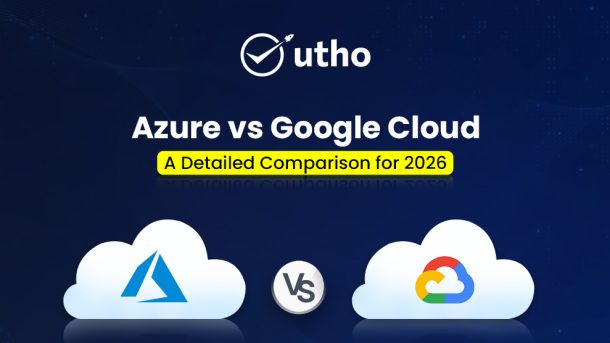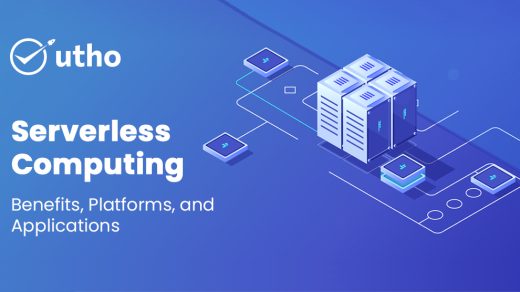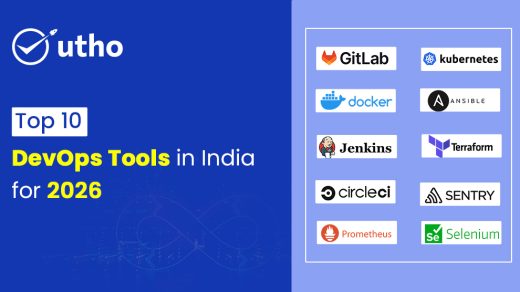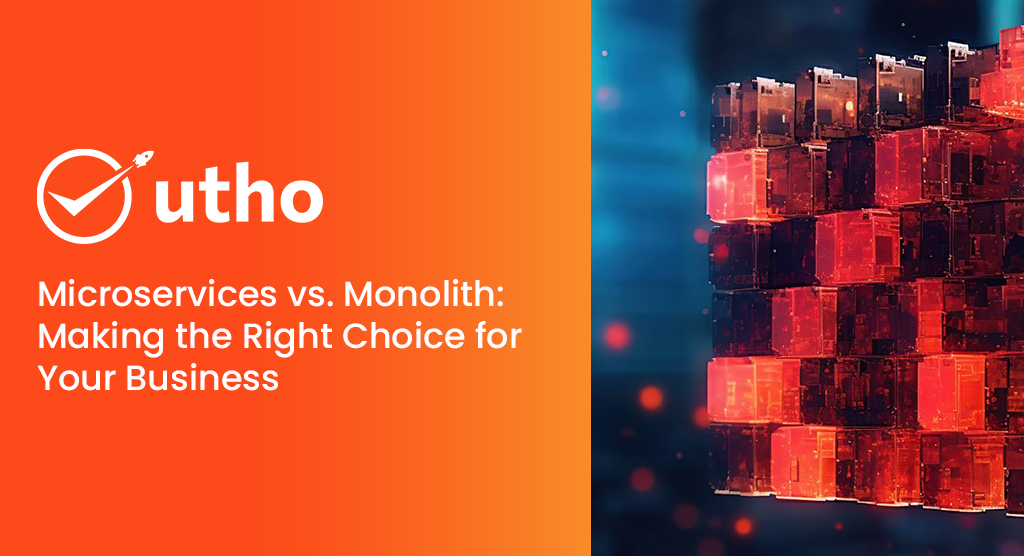In today's fast-changing cloud computing world, organisations must adopt cloud platforms. They want scalability, performance, and innovation, while reducing costs. Microsoft Azure and Google Cloud Platform (GCP) are major, rival providers. Both offer a variety of services to meet business needs.
As we near 2026, businesses must choose a cloud partner. It will affect their growth, agility, and competitiveness. A detailed Azure vs Google Cloud comparison is essential. It will help organisations make decisions that fit their goals, workloads, and budgets.
Why compare Azure vs Google Cloud?
We must evaluate Azure vs Google Cloud. They have a growing influence and unique strengths in the cloud ecosystem. Businesses must understand these differences. They must choose a platform that fits their long-term goals.
1. Market Position
- Microsoft Azure: Azure is part of the Microsoft ecosystem. It has used its enterprise relationships to gain a large share of the cloud market. Azure is ideal for organisations using Microsoft products. It works well with Office 365, Windows Server, and Active Directory. Its focus on hybrid cloud solutions makes it a leader in enterprise and government.
- Google Cloud: The Google Cloud Platform is a later entrant to the market. It has quickly gained traction, especially in data analytics, AI, and ML. GCP excels at managing large-scale data processing. It has advanced tools like BigQuery and AI Platform. So, it is a top choice for data-focused and innovative businesses.
2. Service Offerings
Both Azure and Google Cloud offer complete cloud solutions. They include compute, storage, networking, security, and AI/ML tools. However, their execution and ecosystem integration differ:
- Azure targets enterprise-grade solutions, with a focus on hybrid cloud. Its priorities are enterprise apps and Microsoft product compatibility.
- Google Cloud prioritises open-source tech and advanced analytics. This appeals to businesses needing top AI/ML tools and seamless data management.
Grasping these nuances helps businesses align the cloud platform with their goals. These include both technical and operational aims.
3. Strategic Alignment
Choosing between Azure vs Google Cloud can significantly impact critical areas such as:
- Scalability: Azure is great at hybrid cloud solutions. It scales seamlessly for enterprise workloads. Google Cloud is highly scalable. It suits apps needing big data analytics and containerised workloads.
- GCP leads in innovation. Its data-driven, AI-first approach helps businesses innovate faster. Tools like AI Platform and Vision AI power this. Meanwhile, Azure is improving its enterprise solutions. This includes Azure AI, Cognitive Services, and IoT Edge.
- Cost Management: Both platforms have flexible pricing models. But, businesses must assess their workloads' cost-effectiveness based on usage and tools.
Key Aspects Covered in This Comparison
This comparison will help businesses navigate the Azure vs Google Cloud debate. It will provide insights into:
- Azure and Google Cloud: their strengths, unique features, and market positions.
- Service Comparison: A detailed study of their compute, storage, networking, AI/ML, and security. It will highlight their differences and overlaps.
- Data Centre Coverage: Assess each provider's global infrastructure. Check for availability, redundancy, and compliance with regional data laws.
- Pricing and Cost Efficiency: A breakdown of their pricing. It should offer pay-as-you-go, reserved instances, and sustained-use discounts. The aim is to find the cheapest option.
- Evaluate each platform's uptime, latency, and SLAs. This tests their reliability for critical workloads.
- Security and Compliance: A look at the security tools and compliance certifications of both platforms. This helps businesses protect sensitive data and meet industry regulations.
- Best Use Cases for Each: Scenarios to guide businesses on when to choose Azure or Google Cloud.
- Introducing Utho: An Affordable Cloud Alternative. For low-cost, high-performance cloud solutions, we will introduce Utho. It is a platform that saves money, migrates easily, and optimises infrastructure.
Overview of Azure and Google Cloud
Microsoft Azure and Google Cloud Platform (GCP) are top cloud providers. They are key players in the cloud computing market. To choose between Azure and Google Cloud, businesses must know each platform's strengths, services, and integrations. Both cloud solutions serve different goals. They range from enterprise workloads to AI innovations.
Microsoft Azure: Enterprise-Grade Cloud Solutions
Since its launch in 2010, Microsoft Azure has soared to the top of the cloud kingdom. It has strong ties to enterprise connections and a vast software ecosystem. They give businesses a competitive edge. Azure unlocks potential through its Seamless Integration: Azure integrates perfectly with Microsoft products. These include Windows Server, SQL Server, Active Directory, and Office 365. They are best for companies already using Microsoft technologies. Azure is the leader in hybrid cloud. Its tools,
Azure Arc and Azure Stack, help connect on-premises systems to the cloud.
- Azure offers over 200 services. These address needs in computing, storage, AI/ML, networking, and security. They benefit businesses in various industries.
- Azure operates in over 60 regions globally. This guarantees high availability, backup, and low latency for business tasks.
Best for: Organisations needing hybrid cloud deployments and strong enterprise integrations. Also, a reliable, globally reached cloud platform.
Google Cloud Platform (GCP): Innovation-Driven Cloud
Launched in 2008, Google Cloud Platform taps into Google's strengths in search, ads, and big data. It offers cloud services that focus on innovation, data analysis, and machine learning. Key highlights are:
- AI and Data Analytics Leadership: GCP is a leader in AI/ML tools such as AI Platform, Vision AI, and Dialogflow. Also, businesses using big data gain from GCP's serverless data warehouse, BigQuery. Google is the biggest backer of open-source tools. These include Kubernetes and TensorFlow. They include Apache Beam. This makes GCP a top choice for cloud-native, developer-focused organisations.
- Modern Infrastructure: Google Cloud's private global fibre network. It ensures low latency and high performance. It delivers data quickly, which is ideal for real-time analytics and mission-critical apps.
- Expanding Global Presence: GCP operates in 35+ regions. Its growing data centre network ensures compliance, redundancy, and access in key markets.
Best for: Businesses prioritising AI/ML, data-driven decisions, and open-source integrations. They want to develop innovative apps.
Azure vs Google Cloud: Service Comparison
Both Azure and Google Cloud offer extensive services across critical categories. Here’s a detailed Azure vs Google Cloud breakdown:
| Category | Azure Services | Google Cloud Services |
| Compute | Virtual Machines: Scalable virtual servers. | Compute Engine: Customizable virtual machines. |
| Azure Functions: Serverless compute for event-driven workloads. | Cloud Functions: Serverless execution for code. | |
| App Services: Managed platform for web and mobile apps. | App Engine: Fully managed platform for application deployment. | |
| Storage | Blob Storage: Scalable object storage. | Cloud Storage: Unified object storage. |
| Azure Files: Managed SMB file storage. | Filestore: Managed file storage for NFS workloads. | |
| Disk Storage: Block storage for virtual machines. | Persistent Disk: High-performance block storage. | |
| Database | Azure SQL Database: Managed relational database. | Cloud SQL: Fully managed relational database. |
| Cosmos DB: NoSQL database with global scalability. | Firestore: NoSQL database for app development. | |
| Azure Database for PostgreSQL: Fully managed PostgreSQL service. | BigQuery: Serverless data warehouse for analytics. | |
| AI & ML | Azure Machine Learning: Model training and deployment. | AI Platform: End-to-end ML development. |
| Cognitive Services: Pre-built AI APIs for vision, language, and speech. | Vision AI: Image and video analysis. | |
| Dialogflow: Conversational AI for virtual agents. | ||
| Networking | Virtual Network (VNet): Secure, private networking. | Virtual Private Cloud (VPC): Isolated network for GCP resources. |
| Azure CDN: Global content delivery. | Cloud CDN: Global content delivery network. | |
| Azure DNS: Scalable domain name resolution. | Cloud DNS: Reliable DNS resolution. | |
| Security | Azure Active Directory (AAD): Unified identity management. | Identity and Access Management (IAM): Role-based access control. |
| Azure Security Center: Threat protection and compliance tools. | Security Command Center: Unified security operations. | |
| Azure Firewall: Network security. | Cloud Armor: Distributed denial-of-service (DDoS) protection. |
While both platforms offer a diverse set of services, their implementation and target audiences differ. Azure is enterprise-focused with strong Microsoft integrations, whereas GCP emphasizes open-source flexibility, data analytics, and AI capabilities.
Data Center Coverage
Data center presence plays a vital role in reducing latency, ensuring high availability, and meeting compliance requirements.
- Microsoft Azure:
Azure operates in 60+ regions globally, the largest coverage among cloud providers. This extensive network ensures businesses have access to services regardless of location.
- Google Cloud:
Google Cloud’s infrastructure spans 35+ regions, with a robust focus on high-performance data delivery through Google’s private fiber-optic network. GCP is continuously expanding its reach to compete with Azure.
Both providers offer strong global coverage, but Azure’s wider regional presence provides an advantage for enterprises requiring global scalability.
Introducing Utho: An Affordable Cloud Alternative
While Azure and Google Cloud are powerful cloud providers offering advanced features, they often come with high costs, complex pricing models, and steep learning curves. For businesses seeking a cost-effective, user-friendly, and reliable cloud solution, Utho emerges as a game-changing alternative.
Why Utho Stands Out
- 60% Cost Reduction:
One of Utho's most significant advantages is its ability to reduce cloud expenses by up to 60%. Unlike hyperscalers like Azure or Google Cloud, which can burden businesses with complex pricing tiers and hidden costs, Utho offers transparent and predictable pricing.
-
- Cost Optimization: Businesses can save significantly on compute, storage, and network resources without compromising performance or reliability.
- Higher ROI: Utho’s cost-efficient model allows organizations to reinvest savings into growth, innovation, or operational improvements.
- Free and Hassle-Free Migration:
Migrating workloads to the cloud can often be costly, time-consuming, and resource-intensive. With Utho, businesses benefit from:
-
- Free Migration: A fully managed migration process at no additional cost.
- Fast Implementation: Utho ensures seamless migration within 30 days without disruptions.
- Dedicated Support: Migration experts handle every aspect, making the transition smooth and stress-free for businesses.
- Seamless User Experience:
Utho is designed to provide a simple yet powerful cloud infrastructure tailored to meet the needs of both startups and enterprises:
-
- User-Friendly Interface: Easy-to-use console and tools ensure hassle-free cloud management even for teams with limited cloud expertise.
- Optimized Infrastructure: Built on advanced technology, Utho guarantees high performance, reliability, and scalability for workloads of any size.
- Quick Deployment: Faster provisioning and minimal complexities help businesses deploy and scale applications seamlessly.
Revolutionize Your Cloud Experience with Utho
In a competitive cloud market, Utho provides an innovative, affordable, and no-compromise alternative for businesses aiming to:
- Reduce Costs by up to 60%.
- Simplify Cloud Adoption with free 30-day migration.
- Enhance Performance with reliable, scalable infrastructure tailored for modern workloads.
Whether you're a growing startup looking for a cost-effective solution or an enterprise seeking an optimized cloud infrastructure, Utho delivers unmatched value without the complexity.
Explore Utho’s innovative cloud solutions today and revolutionize the way you manage your cloud infrastructure!
The decision between Azure vs Google Cloud ultimately comes down to your organization’s specific needs and long-term goals. Both platforms offer world-class cloud services, but their strengths cater to distinct use cases:
Microsoft Azure provides a comprehensive suite of solutions, making it the ideal choice for businesses heavily invested in the Microsoft ecosystem or requiring robust hybrid cloud infrastructure. Its seamless integration with enterprise tools like Windows Server, Active Directory, and Office 365 ensures a smooth experience for established enterprises.
Google Cloud Platform (GCP) shines with its AI/ML capabilities and data analytics tools, making it perfect for innovation-driven companies focused on data processing, real-time insights, and modern, cloud-native applications. Google’s leadership in open-source technologies and cutting-edge infrastructure also makes GCP attractive for developers and startups prioritizing flexibility and scalability.
However, for businesses looking to reduce costs without sacrificing performance, platforms like Utho provide a compelling alternative:
- 60% Cost Reduction: Optimize expenses and improve ROI.
- Free 30-Day Migration: Experience a smooth, hassle-free transition.
- Tailored Solutions: Scalable and reliable cloud infrastructure designed for startups, SMEs, and enterprises alike.
By carefully evaluating the strengths of Azure vs Google Cloud and exploring alternatives like Utho, businesses can align their cloud strategy with their goals for performance, innovation, and cost-efficiency.
In the dynamic cloud landscape of 2026, choosing the right cloud partner will not only streamline operations but also position your business for sustainable growth and competitive advantage.
Make the smart choice today and unlock the full potential of your cloud journey!




